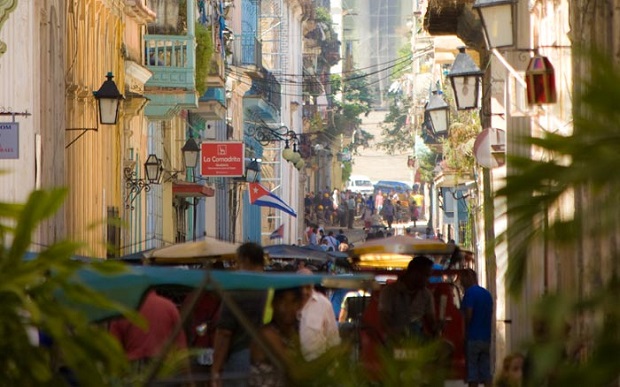
On respect, readiness, and what keeps you up at night
Yes, but what keeps you up at night?”
The question, at first, seemed to startle our friend Emilia, standing with us last Friday night in Havana.
We began our conversation talking about why warmer relations with the United States meant so much to her. She is a state employee who stands to benefit little, if at all, from the surging number of visitors from the U.S.
To her, the opening created by Presidents Obama and Castro is relieving the crushing burden of separation that has weighed on Cubans like Emilia since our paths divided in 1959.
Her eyes, which had flashed with excitement discussing Cuba’s removal from the terror list, quieted and became serious.
“What keeps me up at night? Two things do,” She said. “First, when the increase in travelers comes from the United States, we will not be ready, and you may ask ‘why did we come?'”
And then, more serious still, “The second thing I worry about is that you will not think we have something to offer; that you will not respect us in return.”
If the hardliners in Congress get their way, Cubans will have unlimited time to get ready for more visits from the United States. As we reported last week, they are using the budget bills moving through the House to shut down President Obama’s travel reforms and other features of our historic diplomatic opening with Cuba.
New flights and ferry services would be cut off under provisions of the THUD (Transportation, Housing and Urban Development) appropriations bill. The President’s new approach on sending exports to Cuba – a shot in the arm for the nascent small business sector- are also undermined by spending limits in the Commerce Department funding bill.
These measures, if signed into law by the president, would last for just the forthcoming fiscal year, however legislation introduced this week by Senator Marco Rubio would more permanently stop the flow of money to Cuban businesses associated in any way with Cuba’s military and any entities it controls. As the Latin Post reported yesterday, passage of this legislation would even subject U.S. citizens wishing to travel to Cuba to potential penalties.
Of course, U.S. firms can easily do business with Russia, Saudi Arabia, and China – among many other countries – and U.S. travelers freely visit those places (as Senator Rubio’s Deputy of Chief of Staff did last year on an all-expenses paid trip to Beijing).
It seems like the guiding principle in efforts like Senator Rubio’s is not human rights, but hatred of the Castro government and adherence to the Cold War era strategies of trying to starve the island and its people in order to bring that government down.
Emilia wouldn’t see the respect she is hoping for in recent columns by Andres Oppenheimer and Jose Cardenas. These commentators aren’t at all concerned by U.S. businesses doing deals in Cuba; both are convinced there’s nothing there. Cardenas calling “Cuba” bankrupt, saying it’s like “an overripe mango waiting to be plucked by American business,” and Oppenheimer calling Cuba “one of the most backward countries in Latin America.”
Perhaps they could try seeing Cuba through the same set of open eyes Congressman Bradley Byrne from Alabama brought to the island last week.
Byrne, who visited Cuba with the Center for Democracy in the Americas (we publish the Cuba Central News Blast) with four of his House colleagues, came to Cuba having opposed the President’s decision to remove Cuba from the terror list.
On his return, however, he told WKRG, a local Mobile television station, “Cuba is not involved with the terrorists we see today which is mainly among Islamic groups in the Middle East. So, I think the President made the right decision to remove them from the terrorist list.”
President Obama has promised to veto the budget measures and protect the opening he created with President Castro last year. Week by week more members, like Rep. Tom Emmer of Minnesota, are joining legislative efforts in the House and Senate to lift the ban on travel to Cuba in its entirety.
By many different metrics, Cuba is not ready for a huge influx of tourists from the United States. It suffers from a shortage of hotel rooms as well as infrastructure problems that concern Cuban economists and others we talked with in Havana last week.
But as one of them said, “That’s our problem,” and she urged Rep. Byrne and the other policymakers not to patronize Cuba by withholding U.S. policy changes that ought to be undertaken because they are right things to do.
Prepared or not for an influx of tourists, Cubans are waiting for the respect that all countries deserve from the United States. If we can alleviate that worry of Emilia’s, perhaps we’ll all sleep a bit better.
(From Cuba Central Newsblast)

